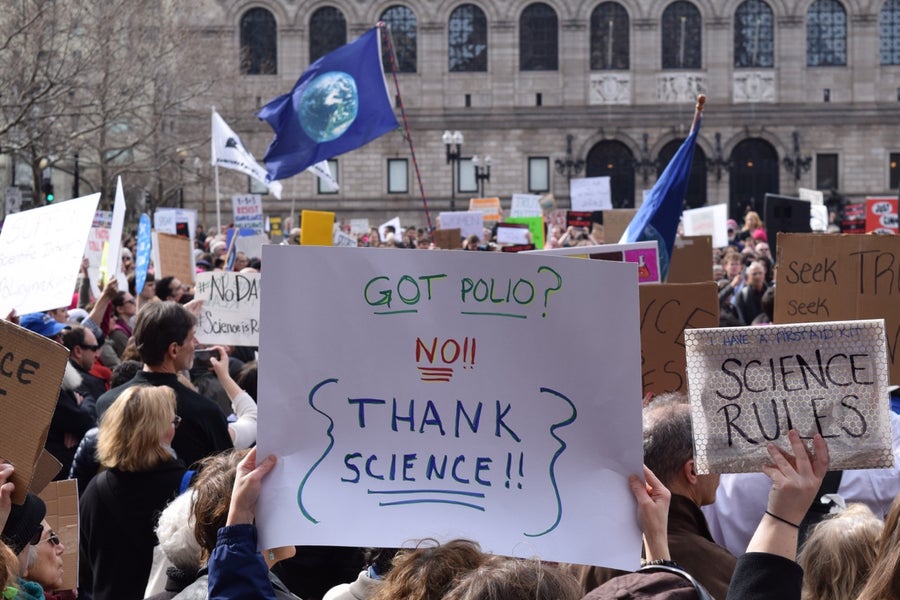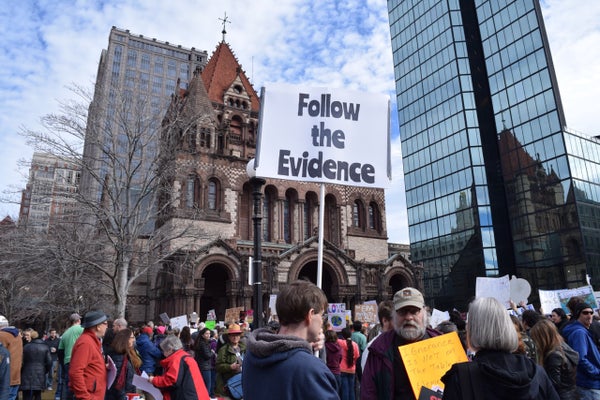BOSTON–Hundreds of scientists put aside their habitual wariness toward political activity and rallied over the weekend in Boston’s Copley Square, with many saying the Trump administration has left them no choice.
“It’s uncomfortable for me as a scientist, but it’s necessary,” said Brittany Goods, a postdoctoral student in biomedical sciences at the nearby Massachusetts Institute of Technology. She carried a sign that read simply: “FACTS.”
Many scientists view political activism as a potential taint or threat to the absolute empiricism that science strives for—or simply feel they cannot afford to take time away from their work. But several said Sunday that they believe they no longer have the luxury of remaining in their labs. Instead, participants in the Rally To Stand Up For Science said they felt compelled to speak out against the new Trump administration’s use of “alternative facts,” climate change denial and restrictions on immigrants—many of whom work in medicine and science.
On supporting science journalism
If you're enjoying this article, consider supporting our award-winning journalism by subscribing. By purchasing a subscription you are helping to ensure the future of impactful stories about the discoveries and ideas shaping our world today.
During Donald Trump’s first month as president, he and his administration have tried to ban immigrants from seven majority-Muslim countries, leaving hundreds of Boston-area scientists and doctors either stranded or separated from their families, or at best uncertain about their status and future. Trump and other officials have been dismissive about climate change despite overwhelming scientific evidence, and have played loose with facts or been otherwise disdainful of what most scientists and major news media see as objective reality.
The rally was timed to coincide with the annual meeting of the American Association for the Advancement of Science (AAAS), being held a few blocks away at the Hynes Convention Center. The five-day conference, which opened Wednesday, chose as its theme this year “Serving Society Through Science Policy." It included a number of policy sessions and packed talks designed to help scientists communicate about their research, and was not a sponsor of the rally.
Naomi Oreskes, a professor of science history at Harvard University, gave a plenary lecture at the conference and also addressed the rally Sunday. “We don’t want to be here,” she told the enthusiastic crowd gathered on a muddy plaza in front of Trinity Church. “We want to do the work that we were trained to do.” But that work is under attack, she said, and—like a family that must respond in self-defense to burglars in their home—scientists now have to protect themselves and their values.
“It is not political to defend the integrity of facts,” said Oreskes, author of Merchants of Doubt, a book about paid experts who have spent decades working to sow doubt in the public’s mind about the risks of tobacco, pesticides and climate change. “We did not politicize our science. We were politicized by people who don’t like our facts.” The United States was founded as an experiment based on reason, she added.
Other speakers drew massive cheers for comments like “Scientists speak truth to power,” and signs in the crowd included “Science is not a liberal conspiracy,” “Science not silence” and “Climate change is NOT a controversy.” Several scientists at the rally emphasized that they view their work as helping society—and see their role in politics in a similar light.
Although some members of the scientific community have criticized protesters as wasting their time at rallies, several participants at Sunday’s event said they felt that simply showing up was important to build solidarity and send a message.

Credit: Karen Weintraub
Dany Adams, a research professor at Tufts University, said she attended because “it does matter if you go and stand there. Being counted matters.” Science, she said, has done a “beautiful” job of training researchers to overcome their own biases. “The development of controls is a great intellectual achievement,” said Adams, a biologist who studies electrical signaling among cells. But Trump and his administration have pushed scientists to stand up for themselves, she said. “It’s sad when someone with power wants to pretend that being educated is meaningless. That’s just personally frightening.”
Scientists have traditionally relied on other people, including the news media, to tell the public about their research—but now they need to tell their own stories, said Santiago Correa, a graduate student in biomedical sciences at MIT. While many people have lost faith in the media—and Trump recently called several news organizations “enemies of the American people—“most Americans still trust scientists,” he said, urging researchers to capitalize on that.
The rally’s sponsors included the Union of Concerned Scientists, Greenpeace USA, Mass Sierra Club and groups from area universities. The AAAS was not an official sponsor and has remained studiously neutral regarding protests. The organization said it was closely monitoring plans for the upcoming March for Science, scheduled to be held on Earth Day, April 22. “It is exciting to see people enthusiastic about science and the use of evidence in policymaking, and we are inspired by the grassroots nature of this movement,” the organization said in a statement. “We have been in contact with the co-chairs of the effort and are learning more about their plans for the event as they develop.”
